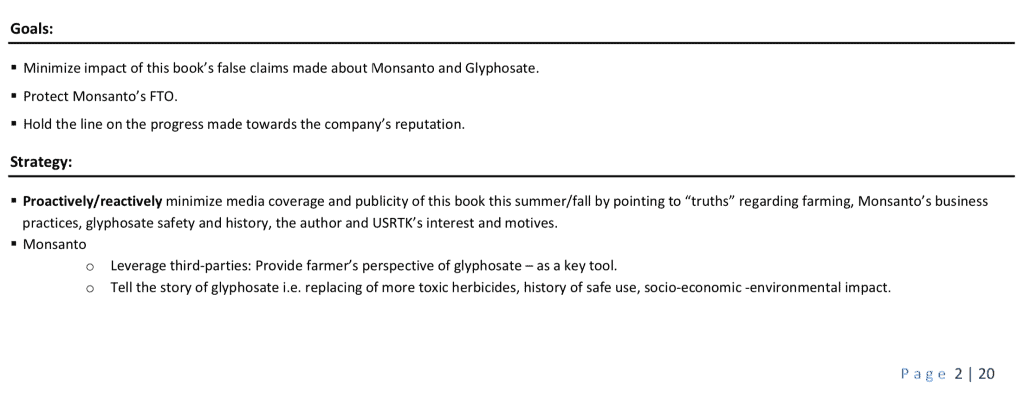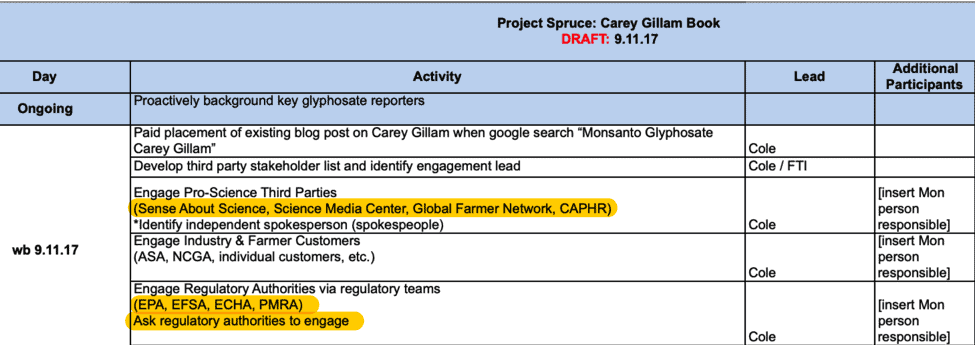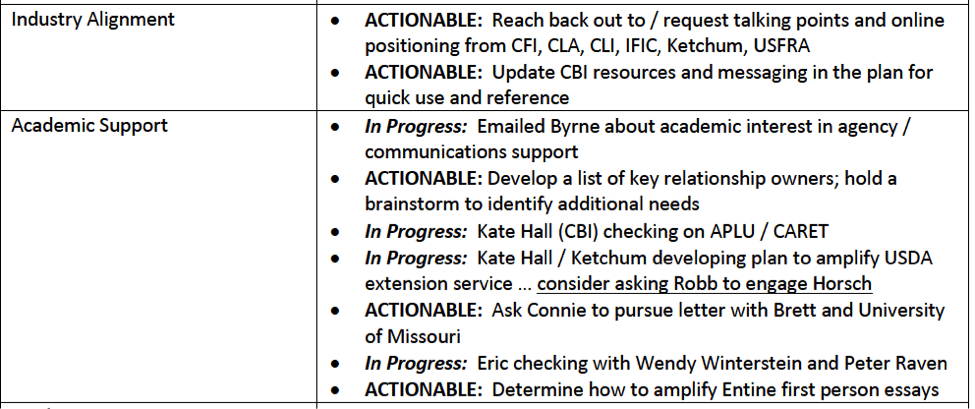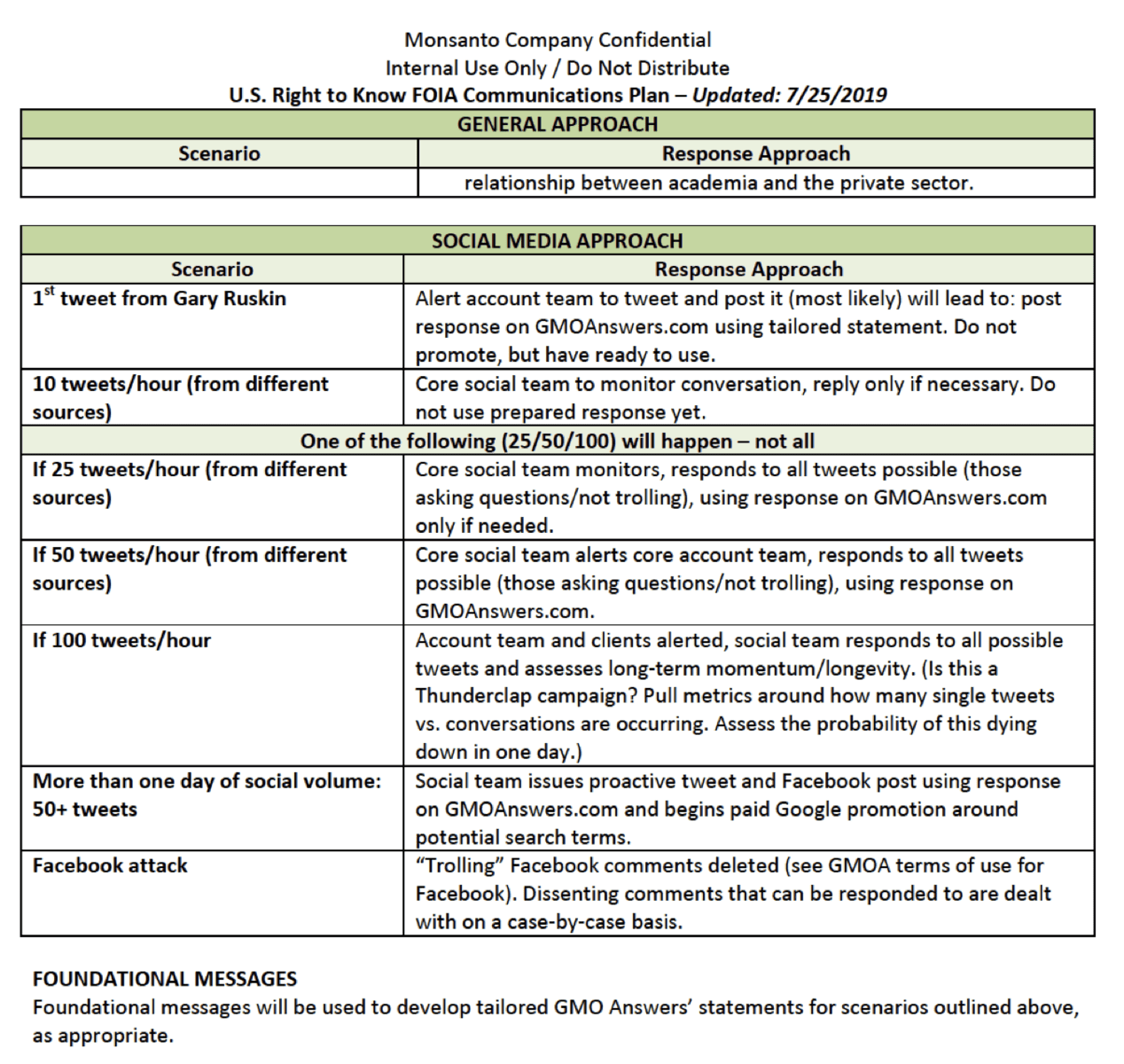In 2021, the Society for Professional Journalists, NorCal chapter, honored U.S. Right to Know with the James Madison Freedom of Information Awards for our work obtaining internal corporate documents that showed how Monsanto recruited public university professors to support its PR goals. Concerned that our research would uncover its influence in academic circles, Monsanto “created a public relations campaign to discredit U.S. Right to Know,” the SPJ noted, but we “exposed those efforts, too.” Here are the details.
Internal documents released in 2019 provide a rare look into the public relations machinery at Monsanto, and how the company tried to contain an investigation by U.S. Right to Know into its relationships with academics and top universities. Our public health research group has made numerous public records requests to taxpayer-funded universities and academics since 2015, leading to revelations about secretive industry collaborations.
The Monsanto documents are posted here
The documents reveal that Monsanto worried, “USRTK’s plan will impact the entire industry” and has the “potential to be extremely damaging.” So they deployed 11 Monsanto employees, two PR firms, and involved the world’s top pesticide companies, via the industry-funded GMO Answers, in plans to discredit our small group.

Monsanto also adopted a strategy to counter the reporting of Carey Gillam, former research director of USRTK, and her investigative book about the company’s herbicide business. Monsanto had a ‘Carey Gillam Book’ spreadsheet, with more than 20 actions dedicated to opposing her book before its publication. The company even investigated the singer Neil Young. See coverage:
- Revealed: how Monsanto’s ‘intelligence center’ targeted journalists and activists, by Sam Levin, The Guardian (8.8.19)
- Documents Reveal Monsanto Surveilled Journalists, Activists & Even Musician Neil Young, Democracy Now! (8.9.19)
- I’m a journalist. Monsanto built a step-by-step strategy to destroy my reputation, by Carey Gillam, The Guardian (8.9.19)
Monsanto’s plan to discredit USRTK: internal documents
Monsanto was deeply worried about USRTK executive director Gary Ruskin’s FOIA investigation, and had an elaborate plan to counteract it. Monsanto was concerned that the FOIAs would uncover its influence in the regulatory and policy process, payments to academics and their universities, and collaborations with academics in support of industry PR and lobbying.
“USRTK’s plan will impact the entire industry,” the Monsanto document notes, “and we will need to coordinate closely with BIO and CBI/GMOA throughout the planning process and on any eventual responses … And, we will need to prepare other associations (i.e. CFI, USFRA, CLI) and key stakeholders so there are no surprises and they are well positioned to provide support.”
Monsanto wanted to protect its reputation and “freedom to operate,” and to “position” the USRTK investigation into industry-academic ties as “an attack on scientific integrity and academic freedom.” The plan relied on seemingly neutral groups that claim to be independent, including GMO Answers (GMOA), Center for Food Integrity (CFI) and the U.S. Farmers and Ranchers Association (USFRA).
More info on these industry-connected groups:
- GMO Answers is a marketing and PR campaign for pesticide companies
- Key pesticide industry PR group closes: GMO Answers moves to Crop Life trade group
- Center for Food Integrity: PR for processed foods, pesticides and GMOs
Pesticide companies and Ketchum PR firm have pitched GMO Answers as a transparency initiative to answer questions about GMOs with the voices of “independent experts,” however the documents described in this post, along with Monsanto PR plan to protect sales of glyphosate based herbicides, suggest that Monsanto relies on GMO Answers to play a product-defense public relations role.
Monsanto worried that USRTK’s investigation would “impact the entire industry.”

The plan reveals that GMO Answers – a group of supposedly independent experts – was integral to Monsanto’s public relations efforts.

The plan describes a “*Worst case scenario*” that could be found in emails obtained by U.S. Right to Know: “Egregious email illustrates what would be the smoking gun of the industry (e.g. email shows expert/company covering up unflattering research or showing GMOs are dangerous/harmful)” (page 26)

Monsanto’s PR plan also called for triggering “emergency calls” with the GMO Answers steering committee if the reach/escalation were serious enough (page 23).
In some cases, Monsanto employees expected access to documents before U.S. Right to Know, even though USRTK requested the documents through state FOI laws. For requests involving the University of California, Davis, the plan notes, “We will have a pre-release view of documents” (page 3).
The plan identified 11 Monsanto employees from five departments, two staffers from the trade group BIO and a staffer from GMO Answers/Ketchum PR firm, who were listed as “key contacts.” (page 4). Two employees from FleishmanHillard were involved in assembling the plan (see agenda email). At the time, U.S. Right to Know had three staffers.
Monsanto worried about Carey Gillam’s book
Several of the newly released documents relate to Monsanto’s efforts to counteract the reporting of Carey Gillam and her book that investigates the company’s herbicide business: “Whitewash: The Story of a Weed Killer, Cancer and the Corruption of Science ” (Island Press, 2017). Gillam is a former reporter for Reuters and current research director of U.S. Right to Know.
These documents include Monsanto’s 20-page “Issues Management / Communication Strategy” for Gillam’s book, which assigns eight Monsanto staffers to prepare for the October 2017 release of Gillam’s book. Their strategy was to “minimize media coverage and publicity of this book this summer/fall by pointing to “truths” regarding farming …”

An Excel spreadsheet titled “Project Spruce: Carey Gillam Book” describes 20 action items. Plans included paying for a post to appear on Google search results for “Monsanto glyphosate Carey Gillam,” generating negative book reviews, and engaging “regulatory authorities” and “Pro-Science Third Parties,” including Sense About Science, Science Media Centre, the Global Farmer Network and the “Campaign for Accuracy in Public Health Research,” a project of the American Chemistry Council.

Documents reveal Monsanto’s Fusion Center
Monsanto planned to “Work with the Fusion Center to monitor USRTK digital properties, the volume and sentiment related to USRTK/FOIA, as well as audience engagement” (page 9). See coverage in The Guardian, Revealed: how Monsanto’s ‘intelligence center’ targeted journalists and activists, by Sam Levin. For more about Fusion Centers, see Stacy Cowley’s reporting in the New York Times, Banks Adopt Military-Style Tactics to Fight Cybercrime.

Third parties Monsanto relied on
Deliverables in a “Comprehensive USRTK FOIA Preparedness and Reactive Plan” dated May 15, 2016 included plans for a “Third Party Content Creation (Forbes post);” an agenda to discuss the plan refers to “Proactive Training for independent experts via GMOA [GMO Answers]” and “allergenicity materials” including an infographic and blog/op eds to be “organized by MON distributed by GMOA”.
Action items for “industry alignment” in the 2019 plan included requesting “online positioning” from the Center for Food Integrity, International Food Information Council, Crop Life America, Crop Life International, Ketchum PR and the U.S. Farmers and Ranchers Alliance (page 6).

Others mentioned in Monsanto’s PR plans included:
- Jon Entine, director of the supposedly independent Genetic Literacy Project. The plan discusses plans to “amplify” essays by Entine, who claimsed to be independent (page 6)
- Rob Horsch of the Gates Foundation. A former Monsanto employee of 30 years, Horsch went on to head up agricultural research and development at the Bill & Melinda Gates Foundation. The plan describes: “consider asking Robb [Fraley] to engage Horsch”) (page 6)
- Jay Byrne, Monsanto’s former communications director now head of v-Fluence PR firm (see Jay Byrne fact sheet) (pages 5 and 6)
- Henry I. Miller, a former FDA official who frequently works with industry. The plan notes a “Potential tag along piece from Henry Miller” (page 29 of 2016 plan) The New York Times exposed Monsanto’s ghostwriting for Henry Miller in 2017: Monsanto Emails Raise Issue of Influencing Research on Roundup Weed Killer.
Social media response
The documents reveal a remarkable attention to detail and concern over social media responses that could be driven by documents uncovered by the U.S. Right to Know investigations. The Monsanto plan describes responses to scenarios from “1st tweet from Gary Ruskin” (“post response on GMO Answers using tailored statement”) to “More than one day of social volume: 50+ tweets” (promote GMO Answers response and begin “paid Google promotion around potential search terms”).

Documents list
Monsanto’s campaign to counteract the U.S. Right to Know public records investigation
Monsanto U.S. Right to Know FOIA Communications Plan 2019
July 25, 2019: Monsanto’s 31-page strategy plan to counteract the FOIA investigation. “USRTK’s plan will impact the entire industry…. Any situation related to this issue has the potential to be extremely damaging…”
Monsanto USRTK FOIA meeting agenda
May 15, 2016: Agenda for a meeting to discuss the USRTK FOIAs with eight Monsanto and two FTI Consulting employees.
Monsanto Comprehensive USRTK FOIA Preparedness and Reactive Plan 2016
May 15, 2016: Earlier draft of the Monsanto strategy to deal with the FOIAs (35 pages).
Monsanto response to FOIA article
February 1, 2016: Monsanto employees crafted a communications plan to provide a “10,000 foot view” of how Monsanto works with public sector scientists and/or provides funding to public sector programs – but not details about which universities they fund or how much. The plan responded to an article Carey Gillam wrote for USRTK, based on documents obtained by FOIA, reporting on undisclosed Monsanto funding to University of Illinois Professor Bruce Chassy.
Unfortunate language AgBioChatter Biofortified boys
- September 2015: Discussion about “unfortunate” language used by an industry representative to communicate with academics and whether AgBioChatter, a list serve of academics and industry reps, was private or confidential. Karl Haro von Mogel of the GMO promotion group Biofortified advised AgBioChatter members to take “the Ruskin Cleanse” of their private emails to prevent damaging disclosures via FOIA.
- Bruce Chassy shared with the AgBioChatter list his responses to a fact checker for Mother Jones (“I plan to respond without providing the requested information”) and his correspondence with Carey Gillam in response to her queries for Reuters about his industry ties.
Monsanto’s plans to discredit Carey Gillam’s Book
Monsanto Company Confidential Issues Management / Communication Strategy for Carey Gillam’s Book (October 2017)
Project Spruce: Carey Gillam Book Excel spreadsheet with 20 action items (September 11, 2017)
Monsanto and FTI Consulting employees discuss the Gillam action plan (September 11, 2017)
Monsanto video prep plans for Gillam book
Monsanto push back on Reuters editors: October 1, 2015: Email from Monsanto’s Sam Murphey: “We continue to push back on her editors very strongly every chance we get. And we all hope for the day she gets reassigned.”
Roundup “Reputation Management”
Reputation Management for Roundup 2014
February 2014: “L&G Reputation Management Sessions Summary, Lyon Feb. 2014” Power Point, with slides that describe what “we want to be known for / we want to avoid being linked with,” and what’s needed to win the argument about glyphosate safety. “Question… are we just managing and delaying decline (like tobacco)?”
Roundup reputation management slide 2014:

![]() Background on U.S. Right to Know investigations
Background on U.S. Right to Know investigations
U.S. Right to Know is a non-profit investigative research group focused on the food industry. Since 2015, we have obtained hundreds of thousands of pages of corporate and regulatory documents via Freedom of Information Act (FOIA), U.S. state and international public records requests, and whistleblowers. These documents shine light on how food and agrichemical companies work behind the scenes with publicly funded academics and universities, front groups, regulatory agencies and other third party allies to promote their products and lobby for deregulation.
News coverage based on documents from USRTK Co-director Gary Ruskin’s investigation of the agrichemical industry:
- New York Times: Food Industry Enlisted Academics in G.M.O. Lobbying War, Emails Show, by Eric Lipton
- Boston Globe: Harvard Professor Failed to Disclose Connection, by Laura Krantz
- The Guardian: UN/WHO Panel in Conflict of Interest Row over Glyphosate Cancer Risk, by Arthur Neslen
- CBC: University of Saskatchewan Prof Under Fire for Monsanto Ties, by Jason Warick
- CBC: U of S Defends Prof’s Monsanto Ties, But Some Faculty Disagree, by Jason Warick
- Mother Jones: These Emails Show Monsanto Leaning on Professors to Fight the GMO PR War, by Tom Philpott
- Global News: Documents Reveal Canadian Teenager Target of GMO Lobby, by Allison Vuchnich
- Le Monde: La discrète influence de Monsanto, by Stéphane Foucart.
- The Progressive: Flacking for GMOs: How the Biotech Industry Cultivates Positive Media — and Discourages Criticism, by Paul Thacker
- Freedom of the Press Foundation: How corporations suppress disclosure of public records about themselves, by Camille Fassett
- WBEZ: Why Didn’t an Illinois Professor Have to Disclose GMO Funding?, by Monica Eng
- Saskatoon Star Phoenix: Group Questions U of S Prof’s Monsanto Link, by Jason Warick
Many of our documents are posted in the free, searchable UCSF Industry Documents Library.
This post originally appeared in 2019. It was updated in 2024.
Donate to USRTK to help us expand our investigations and keep bringing you this crucial information about our food system. USRTK.org/donate









